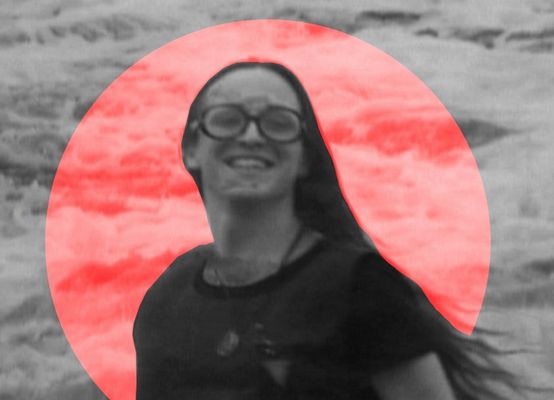
Email us to revise your entry or request it to be deleted.
A black and white photo of Mirha-Soleil Ross. A red, slightly transparent circle frames her. The image is slightly blurry, but we can make out that Mirha-Soleil Ross has light skin, oval glasses, and long hair picked up by a breeze.
Toronto, Ontario, Canada
Montreal, Québec, Canada
Montreal, Québec, Canada (1969)
Jeanne B
1990-
These are the yes/no and closed vocabulary terms that the Portal uses to filter search
results. They are not
necessarily the words this individual uses for themselves.
Learn more
Trans
Yes
BIPOC
Yes
Deaf and disabled
No Data
Gender identities
trans
Race/ethnicities
Native American/First Nation/Métis/Inuit, Indigenous
A highly prolific artist and social activist since the early 1990s, Mirha-Soleil Ross is a force of nature. Raised in Montreal, she moved to Toronto and co-founded the pivotal queer zine Gendertrash From Hell with her partner Xanthra Phillippa Mackay. New issues of Gendertrash were published between 1993 and 1995, compiling original art, poetry, fiction and resource lists, all with the aim of giving “a voice to gender queers, who’ve been discouraged from speaking out and communicating with each other.” Ross went on to helm Counting Past 2, the world’s first trans art festival, and developed a number of performance art pieces that sought to educate audiences about the realities of sex work and debunk stereotypes about trans identity. A staunch animal rights activist, Ross used her post as grand marshal of the 2001 Toronto Pride to lead a squadron of queer animal rights activists into the parade. She has also persistently spearheaded community programs — such as The 519’s Meal Trans program and a trans sex worker outreach program — to fight for better conditions for trans individuals and sex workers in Toronto.
CBC Arts. “Super Queeroes: Mirha-Soleil Ross.” Accessed April 20, 2023. https://www.cbc.ca/artsprojects/superqueeroes/mirha-soleil-ross.Performance artist, videomaker, transsexual activist, curator, sexworker. Transplanted Québécois Ross is Toronto’s most visible and prolific transgender cultural voice. The star of the National Film Board’s well-intentioned documentary In the Flesh (Gordon McLennan, 2000), Ross’s sixteen or so own video productions have much more raw artistic energy and political bite—“gut-busting, ass-erupting and immoderately whorish,” as she says in the compilation of video excerpts. The tapes, often made in collaboration with Xanthra MacKay and Mark Karbusicky, blur boundaries among document, demonstration, performance, narrative, autobiography, representation... and provocation. From her own personal body, history and experience, to the political fields of reproductive technology and animal rights, Ross’s restless art covers a broad landscape of politics and desire. Ross founded Toronto’s “Counting Past Two” trans-arts festival in 1998.
Vtape. “Mirha-Soleil Ross,” n.d. https://vtape.org/artist?ai=101.MIRHA-SOLEIL ROSS is a transsexual video maker, performer, sex worker and animal rights activist born and raised in a poor francophone neighbourhood on the south shore of Montréal, Québec. Since moving to Toronto in 1992, she has produced over a dozen videos which have been screened at festivals internationally. As an activist, Mirha-Soleil worked from 1997-1999 with the staff at the 519 Community Centre to develop Meal-Trans, Toronto’s first publicly funded, multi-services program for low income and street active transsexual and transgendered people. Also in 1997, she created Counting Past 2, a multi-disciplinary art festival dedicated to the promotion of work produced by local and international transsexual and transgendered artists. From 1996-2001, she hosted ANIMAL VOICES, a weekly animal rights radio show on CIUT 89.5 FM. She has been the recipient of several grants from the Canada Council for the Arts and her video, Mateřština (co-directed with Mark Karbusicky), won the Marian McMahon Award at the 2004 Images Festival in Toronto. “I have been producing videos about transsexuality since 1993. I have always seen my work as activist-oriented and as contributing to changing the terms of the conversations around transsexual issues. In addition, my video making has been motivated by my desire to contribute to the development of a small but radical body of work produced by a handful of transsexual film and video makers internationally. Until 1998, most of my videos were concerned with archiving transsexual histories while challenging audiences – particularly those from the lesbian, gay, and feminist communities – with uncensored and diverse representations of transsexual lives, sexualities, and political struggles. While such concerns were certainly noble, since 1997, my video work has become less and less about issues of representation and even less so about a duty to “give a voice to my community.” My focus has shifted to developing a visual language that articulates the joys and perils of living culturally, sexually, and spiritually in a transsexual body. I have no interest whatsoever in producing “objective” video documents. I am personally and politically involved with all of the issues and polemics my video work addresses and this partly explains why so much of it is elaborated from actual performance art pieces. By using performance interventions as points of departure to develop my videos, I end up producing work that is grounded in my body and that reflects a full engagement on my part.” – Mirha-Soleil Ross
VEGANBUMS. “Mirha-Soleil Ross,” July 18, 2006. https://mirhasoleil.wordpress.com/bio/.Mirha-Soleil Ross (b. 1969) is a Métis trans sex worker, performance artist and activist. Raised in Montreal, she moved to Toronto and co-founded the pivotal queer zine Gendertrash From Hell with her partner Xanthra Phillippa Mackay. New issues of Gendertrash were published between 1993 and 1995, compiling original art, poetry, fiction and resource lists, all with the aim of giving a voice to the community. Ross went on to helm Counting Past 2, the world’s first trans art festival, and developed a number of performance art pieces that sought to educate audiences about the realities of sex work and debunk stereotypes about trans identity. Meal Trans, the program which she and Tina Strang began, provided services for sex-workers, particularly low income trans-feminine ones. She also started a trans sex worker outreach program — to fight for better conditions for trans individuals and sex workers in Toronto. Mirha demanded her equal place as a trans woman, sex-worker and as a low income person. These three characteristics had historically caused a wide separation within the community but Mirha refused to be pushed out or stigmatized.
Queer Events. “Mirha-Soleil Ross.” Accessed April 20, 2023. https://www.queerevents.ca/queer/individual/mirha-soleil-ross.-
Chroniques
film/video, 1992
Director
-
Gendertroublemakers
film/video, 1993
Actor, Director
-
An Adventure in Tucking with Jeanne B.
film/video, 1993
Director
-
Dysfunctional
film/video, 1997
Director
-
I Would Never Have Known: A Conversation with Peter Dunnigan
film/video, 1997
Director
-
G-SPrOuT!
film/video, 2000
Director
-
In the Flesh
film/video, 2000
Actor
-
Tremblement de Chair
film/video, 2001
Director, Writer/Screenwriter/Story
-
Madame Lauraine’s Transsexual Touch
film/video, 2001
Director
-
Proud Lives
film/video, 2002
Director
-
Yapping Out Loud: Contagious Thoughts from an Unrepentant Whore
film/video, 2002
Director, Writer/Screenwriter/Story
-
Brandee aka Al Lana Lamarre
film/video, 2007
Director
-
Mark
film/video, 2010
Actor
-
Counting Past 2
1997-1999
programmer
Email us to revise your entry or request it to be deleted.






